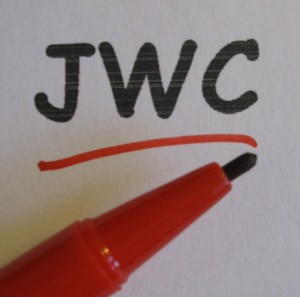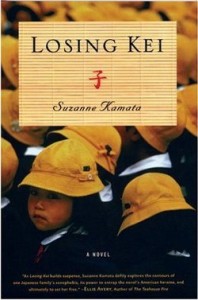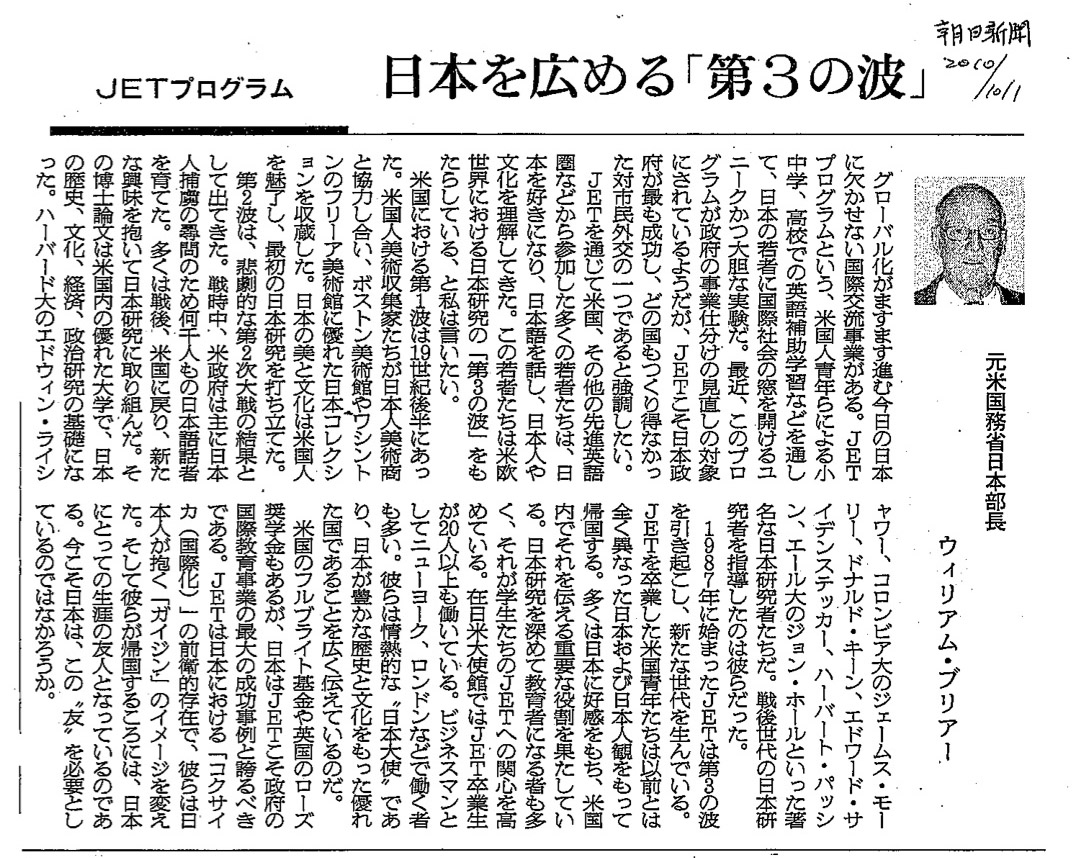Inequality: Why the Tuition Bubble and Student Debt Matter
Matt Leichter (matt [dot] leichter [at] gmail [dot] com) (Saitama-ken 2003-05) is a renegade attorney who plays by his own rules. He operates a think tank of one, The Law School Tuition Bubble, where he archives, chronicles, and analyzes the rising cost and declining value of legal education in the United States. He also maintains the “Bankruptcy Legal Topics,” and, “Bankruptcy Billables,” sections for Steven Horowitz’s Bankruptcy Bill. For further reading regarding JETs and the law, he recommends JETs with J.D.s.
In Japan, young people who’ve been having a tough time finding work are criticized as “parasite singles” or “herbivores,” regardless of whether there actually are living wage jobs for them. The same thing is happening in the U.S., but to make things worse, $850 billion dollars in student debt is hidden from calculations of income inequality, meaning young people are unemployed and not making families, AND America is also less egalitarian a society than people might think.
Thoughts on Human Capital Contracts
Matt Leichter (matt [dot] leichter [at] gmail [dot] com) (Saitama-ken 2003-05) is a renegade attorney who plays by his own rules. He operates a think tank of one, The Law School Tuition Bubble, where he archives, chronicles, and analyzes the rising cost and declining value of legal education in the United States. He also maintains the “Bankruptcy Legal Topics,” and, “Bankruptcy Billables,” sections for Steven Horowitz’s Bankruptcy Bill. For further reading regarding JETs and the law, he recommends JETs with J.D.s.
So you’re tired of hearing about student debt. Well, so am I. You may’ve heard of investing in student equity. Wait, you haven’t? They’re called “Human Capital Contracts”—an investor (or the government) pays for your education in exchange for 10% of your income for ten years. No one else has ever tried something like this. I sat down and thought out what I think of them.
Op-ed on U.S. energy policy by JET alum
![]() JET alums are indeed everywhere. Here’s a recent opinion article by New York-based alum Sam Lederer (Shizuoka-ken, 2005-07), a Contributor at Americans for Energy Leadership, on potential directions in U.S. energy policy for the “lame-duck” session of the U.S. Congress.
JET alums are indeed everywhere. Here’s a recent opinion article by New York-based alum Sam Lederer (Shizuoka-ken, 2005-07), a Contributor at Americans for Energy Leadership, on potential directions in U.S. energy policy for the “lame-duck” session of the U.S. Congress.
CLICK HERE to read some of Sam’s other writings on Japanese energy and environmental policy.
Sam can be reached via his LinkedIn profile and can be followed via Twitter @samlederer
 Stephanie Boegeman (ALT, Akita-ken, 2006-09) gets her kicks from finding fun crazy ways to see the world and getting paid to do it. She is constantly in search of job, internship, and travel ideas to add to her site Playing With Hire, in the hopes that more JET alumni and like-minded souls join her in her quest to find creative, inspiring, and unique ways to make ends meet.
Stephanie Boegeman (ALT, Akita-ken, 2006-09) gets her kicks from finding fun crazy ways to see the world and getting paid to do it. She is constantly in search of job, internship, and travel ideas to add to her site Playing With Hire, in the hopes that more JET alumni and like-minded souls join her in her quest to find creative, inspiring, and unique ways to make ends meet.
Calling all teachers at the elementary through high school level: Here is a great opportunity to travel abroad in the name of professional development. The Distinguished Fulbright Awards in Teaching program is accepting applications through *Dec. 15th*. More details on the program can be found here.
Matt Leichter (matt [dot] leichter [at] gmail [dot] com) (Saitama-ken 2003-05) is a renegade attorney who plays by his own rules. He operates a think tank of one, The Law School Tuition Bubble, where he archives, chronicles, and analyzes the rising cost and declining value of legal education in the United States. He also maintains the “Bankruptcy Legal Topics,” and, “Bankruptcy Billables,” sections for Steven Horowitz’s Bankruptcy Bill. For further reading regarding JETs and the law, he recommends JETs with J.D.s.
Take a break, and listen to some Rock & Roll, primate!
Turn Your JET Experience into Someone’s Dissertation
Teru Iwanaga, a student at Nagasaki University, is working on a graduation thesis about the plight of the ALT. He’s heard the common complaints about native speakers being used as tape recorders and the like, and is interested in investigating whether or not the average ALT’s work situation has improved or not in the last 20 years.
Please contact him at teru.iwanaga@yahoo.com to fill out a very short questionnaire and help him with his research!
Income Based Repayment Helps Law Students, Not the Tuition Bubble
Matt Leichter (matt [dot] leichter [at] gmail [dot] com) (Saitama-ken 2003-05) is a renegade attorney who plays by his own rules. He operates a think tank of one, The Law School Tuition Bubble, where he archives, chronicles, and analyzes the rising cost and declining value of legal education in the United States. He also maintains the “Bankruptcy Legal Topics,” and, “Bankruptcy Billables,” sections for Steven Horowitz’s Bankruptcy Bill. For further reading regarding JETs and the law, he recommends JETs with J.D.s.
Newer law students (and graduate and other professional students) can take hope: between fully financing their legal education with Direct Loans & Grad PLUS loans and electing the Income Based Repayment option, legal education isn’t a crippling investment. Find out why it’s not a great solution, and why it certainly won’t reduce law school costs.
New: JETAA Education Professionals Group on LinkedIn
Update 10/15/10: It turns out a JETAA Education Professionals group had already been created by JET alum Joshua Flannery (who also serves as Secretary for JETAA Western Japan). Despite some minor initial confusion, this is a really good thing since he’s been doing a great job with an existing group and now we’ll have even more people.
I’ve just set up a “JET Alum Education Professionals Group“ on LinkedIn.
Here’s the updated link to join: http://www.linkedin.com/groups?mostPopular=&gid=2973279
The goal is to bring together as many JET alum teachers plus education policy/government/academic folks as possible, as well as any JET alums who are interested in getting into the field or just have an interest in the topic period.
A bigger purpose is that it would be nice if JETAA can start being a source of good ideas for improving the JET Programme. JET alum teachers and other education professionals are a good resource for helping to make that happen. And the first step is figuring out who is out there (since there are no official lists or databases of JET alumni and what they’re doing now).
Of course, another purpose of the group is networking and also a way for established JET alumni to help those getting started or figuring out their path.
So don’t be shy. Step right up and start getting to know your fellow JET alum education professionals around the world.
Note: “I” = Steven Horowitz (Aichi-ken, 1992-94)
Dear ABA Committee Chair, No, It’s Not That Complicated. Signed, The Legal Profession
Matt Leichter (matt [dot] leichter [at] gmail [dot] com) (Saitama-ken 2003-05) is a renegade attorney who plays by his own rules. He operates a think tank of one, The Law School Tuition Bubble, where he archives, chronicles, and analyzes the rising cost and declining value of legal education in the United States. He also maintains the “Bankruptcy Legal Topics,” and, “Bankruptcy Billables,” sections for Steven Horowitz’s Bankruptcy Bill. For further reading regarding JETs and the law, he recommends JETs with J.D.s.
Just how powerless is the ABA in the face of a tuition bubble and legal labor oversupply? Not as much as it believes it is. Check out how it suffers from Stockholm Syndrome here.
Guest Post: A Few Humble Suggestions to Burst Your Bubble
Matt Leichter (matt [dot] leichter [at] gmail [dot] com) (Saitama-ken 2003-05) is a renegade attorney who plays by his own rules. He operates a think tank of one, The Law School Tuition Bubble, where he archives, chronicles, and analyzes the rising cost and declining value of legal education in the United States. He also maintains the “Bankruptcy Legal Topics,” and, “Bankruptcy Billables,” sections for Steven Horowitz’s Bankruptcy Bill. For further reading regarding JETs and the law, he recommends JETs with J.D.s.
Everitt Henry relieves my workload and gives us three suggestions for dealing with lawyer oversupply and the tuition bubble.
WIT Life #130: Nobel Prize honors
WITLife is a periodic series written by professional Writer/Interpreter/Translator Stacy Smith (Kumamoto-ken CIR, 2000-03). She starts her day by watching Fujisankei’s newscast in Japanese, and here she shares some of the interesting tidbits and trends together with her own observations.
Japanese professors 75-year old Eichi Negishi of Purdue University and 80-year old Akira Suzuki of Hokkaido University received news this week that they had won the $1.5 million 2010 Nobel Prize in Chemistry for their work on organic synthesis. This chemical method allows scientists to test cancer drugs and make thinner computer screens, and it is one of the most sophisticated tools available today. They share this honor with 79-year old American Richard Heck of the University of Delaware, but the three recipients worked entirely independently of each other, an unusual situation for joint winners.
Negishi shared that he started dreaming about winning the prize when Read More
Asahi newspaper column offers perspective on the value of JET Programme to Japan
The following is a synopsis/loose translation of Bill Breer’s recent op-ed piece about the importance of the JET Programme to Japan which appeared in the My Viewpoint column of the Asahi newspaper from October 1, 2010. Breer is the former Japan Chair at the Center for Strategic & International Studies.
I thought it was worth sharing with the JET alum community as it provides some rather helpful perspective on the value to Japan of the JET Programme and the JET Alumni Association.
In this world of ongoing globalization, the JET Program is a daring, unique effort to open up the world to students in Japan. It is the Japanese government’s most successful program, and no other country has been able to create a citizens’ exchange initiative like it.
The many young people who have participated in the Program from the world’s leading English-speaking countries have come to like Japan, have learned the language, come to know the people and culture, and have gone on to become the “Third Wave” of Japanese scholarship.
The “First Wave” developed from the mid-19th century as art collectors worked with Japanese artists and merchants to build the great collections at the Boston Museum of Art, the Freer Galleries in Washington, DC, and others, entrancing Americans with Japan’s beauty and culture and producing the first research on Japan.
The “Second Wave” came out of the tragedy of the Second World War, as the US government trained thousands of soldiers in Japanese language for the war effort. These people came home with a deep interest in Japan and created the base of scholarship into Japan’s history, culture, economics and politics at the great universities. These men include Edwin Reischauer at Harvard, James Morley, Donald Keene, Edward Seidensticker and Herbert Passin at Columbia, and John Hall at Yale.
Now, the JET Program, begun in 1987, has given birth to a new generation. These people have an entirely different perspective on Japan and the Japanese people. Many of them have a fondness for Japan and are instrumental in conveying that to people in their home countries. Furthermore, many have gone on to become educators conducting further research on Japan, and this piques their students’ interest in JET. Over 20 ex-JETs work at the US Embassy in Tokyo, and many more work in business in New York, London, and other major cities. They are all passionate “Japanese ambassadors”, conveying the message that Japan is an outstanding country with a rich history and culture.
America has the Fulbright Program and England the Rhodes Scholarships, but Japan should be proud of its JET Program as the most successful example of a government youth exchange program. JET is the advance guard of Japan’s “internationalization”, whose participants have changed the Japanese people’s perceptions of “gaijin” and then gone home to become lifelong friends of Japan.
Japan could still use “friends” like these, couldn’t it?
Here is the original column:
JET alums at Japan Writers Conference in Tokyo
 The 4th annual Japan Writers Conference will be held Oct. 10-11 in Tokyo with 30 writers giving 50-minute presentations about the artistic and business sides of their respective fields, which inlcude fiction, poetry, journalism and even EFL textbook writing. At least four of the presenters are former JETs.
The 4th annual Japan Writers Conference will be held Oct. 10-11 in Tokyo with 30 writers giving 50-minute presentations about the artistic and business sides of their respective fields, which inlcude fiction, poetry, journalism and even EFL textbook writing. At least four of the presenters are former JETs.
The venue is the Ekoda Campus of Nihon University College of Art. You can find full details by visiting http://www.japanwritersconference.org/or following the event on Twitter via http://twitter.com/JapanWritersCon
Here are some slightly shortened versions of the official descriptions of presentations to be made by JET alums:
DWAYNE LIVELY (Niigata-ken, 1996-99) “My Freeware Life.”
The lecture focuses on my experiments with various freeware writing programs, some of which promise to help improve the writing process. The first part of the lecture introduces a number of freeware writing programs that have been suggested by and/or designed by fellow writers. I will explain the results of my experiments with each program and will demonstrate how easy, or not, they are to use, how they changed my writing process and whether or not I intend to keep using them. Next, I will describe what happened when I attempted to follow a handful of “how to write a novel” plans offered free online. Finally, I will introduce the moral if the lecture, including what I learned and what I managed to accomplish during all the experiments.
Dwayne Lively’s fiction has appeared in Twister, Kansas Quarterly, and The MacGuffin. His non-fiction and reviews have appeared in Transitions Abroad, Literary Magazine Review and online at Notebookism.com. He has been a writer, teacher and editor for the better part of 20 years and worked and taught in Japan, the USA and Albania. In his dwindling free time he’s been finishing up a novel and, on occasion, writing the online journal The Crazy Japan Times ( http://www.crazyjapan.com).
SUZANNE KAMATA (Tokushima-ken, 1988-90): “Marketing for Beginners.”
 Getting your book into print is the easy part. Publishing it – making your work known to the public – takes a bit more effort. These days, writers are often expected to submit a marketing plan along with manuscripts, and most publishers expect writers to take an active role in marketing. So how do you market a book if you’re living in rural Japan, far from your target audience? Suzanne Kamata, author of five books with meagre advertising budgets, will suggest some easy, cheap, and not so obvious ways for expats to spread the word about their books.
Getting your book into print is the easy part. Publishing it – making your work known to the public – takes a bit more effort. These days, writers are often expected to submit a marketing plan along with manuscripts, and most publishers expect writers to take an active role in marketing. So how do you market a book if you’re living in rural Japan, far from your target audience? Suzanne Kamata, author of five books with meagre advertising budgets, will suggest some easy, cheap, and not so obvious ways for expats to spread the word about their books.
Suzanne Kamata again: “Kickstart Your Creativity”
Suzanne Kamata will lead participants in writing exercises meant to warm up the writer and/or kickstart creativity when the muse is absent. Bring a notebook and a writing implement.
Suzanne Kamata is the author of the novel Losing Kei (Leapfrog Press, 2008) and editor of three anthologies – Love You to Pieces: Creative Writers on Raising a Child with Special Needs (Beacon Press, May 2008) The Broken Bridge: Fiction from Expatriates in Literary Japan (Stone Bridge Press, 1997), and Call Me Okaasan: Adventures in Multicultural Mothering (Wyatt-Mackenzie Publishing, 2009). She also serves as fiction editor of the popular on-line journal literarymama.com from Tokushima, Japan, where she lives with her family.
TODD JAY LEONARD (1989-92): “So you want to publish an EFL textbook?–Four Points of View to Consider when Writing a Proposal–The Myths and Realities of EFL Publishing in Japan.”
Most likely, every language teacher in Japan has (at some point during his/her tenure) contemplated writing a textbook to fill a void in the market…in that constant search for the perfect, all encompassing textbook. What are publishers looking for in the current market? What appeals to editors who ultimately decide which titles go to production and which ones do not? What are the salespeople on the front lines hearing from their market base? What must an author do in order to get his/her book published? This presentation focuses on these very questions, offering inside insights from all the various points of view that must be considered when writing a proposal to publish a textbook–the publisher, the editor, the salesperson, and the author.
Todd Jay Leonard has been actively involved in book publishing for twenty years and has published twenty books. He lives, writes, and teaches on the southern island of Kyushu, where he is a university professor at Fukuoka University of Education. He has published extensively in academic journals, magazines and newspapers on cross-cultural, historical, and Teaching English as a Foreign Language (TEFL) themes.
TOM BAKER (Chiba-ken, 1989-91), “Interviewing Creative Subjects: Actors, Authors, Artists and Auteurs.”
Interviewing a creative subject requires thorough preparation to elicit original and interesting quotes. My talk will explain how to do the research, write the questions and conduct the interview. It will briefly touch on turning quotes into a story. A well-prepared interviewer will be familiar with the subject’s previous interviews, online self-expression and body of work. The interviewer will look for themes and connections in the work to ask probing questions about its meaning. The interviewer will prepare questions ranging from basic to technical to off-the-wall, but will use the list only as a guideline to the conversation. The interviewer will tolerate digressions (within reason) and allow thoughtful silences to bear fruit. The interviewer will look for local angles and connections to current events.
Tom Baker has been a staff writer for The Daily Yomiuri since 2001, and has interviewed Sylvester Stallone, Liv Tyler, Marlon Wayans, John Woo, Nicholas Sparks, Barry Eisler, Brian K. Vaughan, Michael Sowa and many others. He is a coauthor of Tokyo Chic and The Sushi Lover’s Cookbook.
Department of Education to the Rescue? Proposed CFR Changes to account for “Program Integrity” and “Gainful Employment”
Matt Leichter (matt [dot] leichter [at] gmail [dot] com) (Saitama-ken 2003-05) is a renegade attorney who plays by his own rules. He operates a think tank of one, The Law School Tuition Bubble, where he archives, chronicles, and analyzes the rising cost and declining value of legal education in the United States. He also maintains the “Bankruptcy Legal Topics,” and, “Bankruptcy Billables,” sections for Steven Horowitz’s Bankruptcy Bill. For further reading regarding JETs and the law, he recommends JETs with J.D.s.
Unlike Japan, the United States has no trouble filling graduate degree programs, as this NYT article on Japanese higher education points out. The student debt situation in the U.S. is so dire that the Department of Education is adopting a new regulation to require some schools to demonstrate their graduates are employed and paying down their debts after graduation. Can this rule apply to the ever more expensive law schools?? Find out here.
Matt Leichter (matt [dot] leichter [at] gmail [dot] com) (Saitama-ken 2003-05) is a renegade attorney who plays by his own rules. He operates a think tank of one, The Law School Tuition Bubble, where he archives, chronicles, and analyzes the rising cost and declining value of legal education in the United States. He also maintains the “Bankruptcy Legal Topics,” and, “Bankruptcy Billables,” sections for Steven Horowitz’s Bankruptcy Bill. For further reading regarding JETs and the law, he recommends JETs with J.D.s.
Take a break, and listen to some Rock & Roll!






